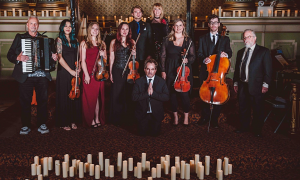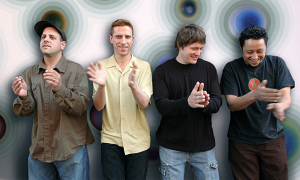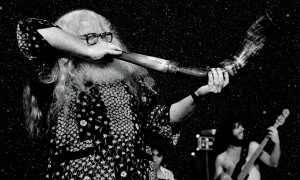Home » Jazz Articles » From the Inside Out » Places in Space, in Time
Places in Space, in Time
Abraham Inc.
variousTogether We Stand
Table Pounding Music
2019
"Ever since I formed Klezmer Madness! in the mid 1990's I've been exploring the possibilities of adding funk, jazz, and lately hip-hop influences to klezmer," explains David Krakauer, an expert clarinet voice in jazz, klezmer and classical music. So, when Krakauer learned during a 2005 tour with pianist, accordionist, singer, rapper, composer and producer Josh "Socalled" Dolgin that a friend of a friend was performing with

Fred Wesley
tromboneb.1943
Trombonist Fred Wesley began his professional career in the legendary Ike and Tine Turner Revue, served for nearly a decade as trombonist, composer, arranger and musical director for the incendiary

James Brown
vocals1933 - 2006
 "
data-original-title="" title="">Parliament Funkadelic and Bootsy's Rubber Band while also performing and recording on his own.
"
data-original-title="" title="">Parliament Funkadelic and Bootsy's Rubber Band while also performing and recording on his own. Krakauer arranged to meet Wesley in New York City ("at the Carnegie Deli, where we had matzoh ball soup," recalls Krakauer). They adjourned to a small rental rehearsal studio, began improvising over one of Socalled's beats, and quickly figured out that playing together would be a blast. There's no shortage of riotous fun on this resultant set, as both soloists keep their Jewish American and African American cultural melting pots bubbling hot. But Krakauer, Wesley, 'Socalled' and company fight for more than just their right to party.
"The News Keeps Babblin' On" wordplays on Babylon, with Krakauer howling about contemporary sociopolitical dystopia in between Ari Caprow's electric blue guitar riffs. The opening title track and "Lullaby for Charlottesville" resonate with meaning in the light of 2020's global activism, and the clarinetist's unaccompanied closing to his "Lullaby" burns like a genuine wail from his soul. Wesley and Krakauer simultaneously rip into solos to create a gloriously disorderly and unkempt, thematically perfect sound in "The Hippies Were Right."
"Blue Pepper" dresses up "Blue Pepper (Far East of the Blues)," from

Duke Ellington
piano1899 - 1974
Given the importance of food in each culture, the fact that Together We Stand was consummated over a shared meal makes perfect sense and makes this truly tasty collaboration seem even more delicious.


Gerald Beckett
fluteMood
Pear Orchard Records
2020
Flautist, bandleader and composer

Gerald Beckett
flute
Miles Davis
trumpet1926 - 1991

Ellis Marsalis
piano1934 - 2020

Astor Piazzolla
bandoneon1921 - 1992

Gerry Mulligan
saxophone, baritone1927 - 1996

Wynton Marsalis
trumpetb.1961

Ron Carter
bassb.1937
Mood strikes a big and warm old-school acoustic sound and hits it right from the opening "Down Low." "Composing this song brought to mind the many 'juke joints' once owned by relatives and family friends," writes Beckett in the notes to "Down Low." Beckett's flute sounds strong, supple and sure as it swings and sings this sweet and funky groove. "Down Low" places Beckett in the lineage of classic jazz flutists, and in an instant. It's hard to imagine a more effective opening tune than this.
"Ode to Ray Wood," paints Beckett's sonic portrait of the wooded "place where we as a family made many frequent visits to my mother's many relatives": Horns sound the peal of a train whistling down a distant track as rustling percussion brings out animal sounds of the night. Beckett's flute rises up and flutters against the sky, a bird singing a reflective nightsong which meanders like a country stroll in familiar woods that you're in no particular hurry to pass through. Noah Frank slips into a trumpet solo dripping with soul, blues and funk to close down the night.
"Ode to Ray Wood" so profoundly evokes the sound of

Yusef Lateef
woodwinds1920 - 2013

Kenny Barron
pianob.1943
"Minor Funk" (

Cyrus Chestnut
pianob.1963

Thelonious Monk
piano1917 - 1982
 Cry Babies
Cry BabiesCry Babies
Far Out Recordings
2020
Far Out Recordings digs deep into its historical archives to reissue this first and only release by Cry Babies, a Brazilian group inspired by the hard-charging winds of change of 1960s soul and R&B blowing in from the US.
History hasn't left behind many traces of Cry Babies—its 1969 debut has until now been extraordinarily difficult (and expensive) to find on vinyl—other than these sounds. Most musician credits only list first names except for organ player S©”rgio Carvalho and producer Durval Ferreira, whose career also includes work with Eurmir
 "
data-original-title="" title="">Deodato and
"
data-original-title="" title="">Deodato and 
Sergio Mendes
piano1941 - 2024
Cry Babies throws itself so quickly and passionately into "It's My Thing" (" data-original-title="" title="">The Isley Brothers) that the musicians seem to forget what time it's written in, driving it hard and fast into punkish R&B, like an early version of

The Who
band / ensemble / orchestraLed by the '60s classic Hammond B-3 organ sound but still featuring the horn arrangement, "Questions 67/68" simultaneously suggests the original version from
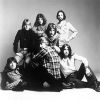
Chicago
band / ensemble / orchestrab.1967
"Caminhos Diab©«licos" reprises "Evil Ways" into three minutes of Latin boogaloo and funk, with the psychedelic guitar, drums and especially congas mixed up front so it sounds fuller, more Afro-Cuban and vibrant.
Cry Babies ends with the same lowdown and dangerous spirit in which it began, tearing through "Good Golly Miss Molly" as if trying to frantically scratch out a

James Brown
vocals1933 - 2006


JC Hopkins Biggish Band
band / ensemble / orchestraNew York Moment
Twee-Jazz Records
2020
On New York Moment, pianist

JC Hopkins
pianoAlicyn Yaffee
guitarThe opening track leaves you genuinely "Beguiled" as vocalists Nico and Joy harmonize through the verses and the nostalgic sound of Hopkins' ensemble immediately transports you back more than half a century in time, to the optimistic halcyon sound of the swing and bop eras. It all creates the alluring feel of nightclub cabaret.
Alto saxophonist Julian Priestly leads the ensemble as they sing through this big band blowout of

Charles Mingus
bass, acoustic1922 - 1979
Evan Hyde
drums"The Children Will Lead Us" walks this set out with a gritty and funky big band blues stomp. Drummer Hyde bumps and thumps the fat and heavy beat that turned into rock 'n' roll someplace on the road from New Orleans to Memphis, while
Alicyn Yaffee
guitar
T-Bone Walker
guitar, electric1910 - 1975
Hopkins' previous release also captured a musically historic New York Moment: His ambitious Meet Me at Minton's (2017, Self-Produced), with vocal guests including

Jon Hendricks
vocals1921 - 2017

Andy Bey
piano1939 - 2025
 "
data-original-title="" title="">Dave Liebman Group
"
data-original-title="" title="">Dave Liebman GroupExpansions: Earth
Whaling City Sound
2020
When saxophonist, composer, and bandleader

Dave Liebman
saxophoneb.1946

Pat Metheny
guitarb.1954

Billy Hart
drumsb.1940

Cecil McBee
bassb.1935

Kenny Werner
pianob.1951

Jack DeJohnette
drumsb.1942

Dave Holland
bassb.1946
Released nearly twenty-five years after the series' first installment, Earth paints sonic portraits of "The Sahara," "Grand Canyon/Mount Everest" and other majestic natural landmarks, plus one of man's most cunning modern contraptions, the "Concrete Jungle." Expansions sketch and color them from a celestial viewpoint, like you're circling around instead of walking upon them, and intersperse these portraits with improvised instrumental interludes on bass (

Tony Marino
bass
Alex Ritz
drums
Bobby Avey
pianoLiebman's orbital portrait of Earth is abstract, almost clinical, in its observational perspective. It opens and closes with "Earth Theme," with the leader's unaccompanied soprano sax prying the lid up and off of the surrounding electronics until the polyphony of the planet slowly emerges into fuller view.
For a song about molten and tumbling rock, "Volcano/Avalanche" sounds very open and free. Soprano and keyboard sounds coalesce around a loping bass line and drums, then the soprano sax and wind synthesizer erupt into a screaming argument that leaves the bass and drums scrambling in pursuit. "Volcano/Avalanche" connects to "The Sahara" via the "Percussion/Flute Interlude" that Ritz improvises with a natural and native, warm acoustic sound.
"The Sahara" is the longest piece on Earth and also the composition that makes most effective use of the complete ensemble instead of just pieces of it. Bassist Marino keeps the ground moving like a busy bulldozer while pianist Avey untethers an electric solo that the ensemble watches float up and away. Liebman's soprano returns to lead the final expedition.
Dave Liebman's expansive Expansions: Earth is powerfully and literally spaced out. "This recording celebrating different aspects of our planet relies heavily on colors emanating from various digital and sound source equipment used by the keyboard and wind synthesizer," he suggests. "For me on the soprano sax, I am the lone acoustic instrument juxtaposing the old and the new (with the drums in the same zone). Melody and harmony play a lesser role in this kind of music...texture rules."


Gaetano Partipilo
saxophone, altob.1974
Boom Collective—Live Somewhere
Auand Records
2020
Italian saxophonist

Gaetano Partipilo
saxophone, altob.1974

Enrico Rava
trumpetb.1939

Tony Scott
clarinet1921 - 2007
In 2013, Partipilo released Besides: Songs from the Sixties (Schema Records), genuine and warm modern interpretations of classic '60s sounds stylishly produced by legendary European soul-jazz groovemeister

Nicola Conte
multi-instrumentalistGaetano's Boom Collective ensemble unleashes a decidedly modern electronic jazz sound on this live recording from their late 2019 tour of Italy. The opening "In tension" serves immediate notice, drifting in on an electronic soundcloud that the Collective roars through like an exploding army. Electric guitarist

Fabrizio Savino
guitar, electricb.1981
"Love Boom" ventures into more spacy stratospheres but maintains this aggressive rhythm and sound. Several instruments simultaneously enter (some shoving others aside to make room for themselves) then settle down into the groove behind Partipilo as his alto floats into the melody. Pianist
Seby Burgio
keyboards
Carolina Bubbico
vocalsb.1990
Angela Esmeralda
vocals
Chet Baker
trumpet and vocals1929 - 1988
After the leader's extended and exhilarating spotlight in "Close your eyes," Live Somewhere fades out with "Dark Matter," bouncy jazz-rock fusion first led through the melody by vocals that give way to the leader's alto. Partipilo steers the band into a funkier R&B rhythm and then keeps driving them with his most expressive and truly swinging solo of this set. Even his deliberately smeared and jagged notes sound so pretty.


Markus Reuter
guitar, electricb.1972
The Truce
MoonJune Music
2020

Markus Reuter
guitar, electricb.1972

Robert Fripp
guitarb.1946

Stick Men
band / ensemble / orchestra
Tony Levin
bassb.1946
A set like The Truce could be a disaster in the hands of a lesser talent, but Reuter never repeats himself in this hour-long guitar showcase. The Truce is a truly international affair (a hallmark of the MoonJune imprint), as it teams German-born guitarist Reuter with Israeli drummer

Asaf Sirkis
drumsb.1969
This three-piece ensemble embodies the term "power trio." Even though it explodes in digital sound and color, the unbridled exploration yet rigor and discipline of the opening title track crackles with the influence of progressive-rock bands born like

King Crimson
band / ensemble / orchestrab.1969
The extended drum and bass intro to "Let Me Touch Your Batman" builds tension and anticipation for the angry guitar sound that eventually buzzes through to the other side of their deep rhythm, swarming and stinging the music and eventually circling downward to land on the ground and rest.
Bassist Trentini sets up the closing "Gossamer Things" with a fun little bounce, popping up and off of Sirkis' unshakeable beat. The trio coalesces into sheets of hot sound and just when you begin to think the sound couldn't possibly become even hotter or harder, they smack headlong into a freeform segment, regroup, count off and then stomp back into the tune with even more sonic power. Gossamer? Molten lava is more like it.
The press announcement of

Markus Reuter
guitar, electricb.1972
 Third Sound
Third SoundHeard in Havana
Innova Recordings
2020
In July 2015, the US and Cuba re-established formal diplomatic relationships with the joint opening of their respective embassies in Havana and Washington, DC. The following November, the American Composers Forum sent ten composers and the instrumental ensemble Third Sound to perform a program of contemporary American music at the 28th Havana Contemporary Music Festival. Heard in Havana simultaneously presents this program and the recording debut of Third Sound: Sooyun Kim (flute), Romie de Guise- Langlois (clarinet), Karen Kim (violin),
Michael Nicolas
celloMany of these structures on Heard in Havana maximize space and silence as musical commentary on modern lives stuffed full of too much clutter, busy-ness and noise, and avoid bright tonal colors in favor of shades of grey and black. "Smash" (by Jennifer Higdon) represents contemporary society's insistence on more speed in communication, in transportation and in general. Flute and violin seem to bounce off the piano, which then sets off in hot pursuit of the flute and violin, chasing faster and faster around to the end. "Smash" suggests the accompaniment to a chase scene in a Bugs Bunny or other classic Warner Bros. cartoon, and simply stops dead like it ran into a brick wall.
"Inexpressible (v. 2)" (Amadeus Regucera) centers on a three-way conversation or argument with flute, cello and violin each taking turns dominating the point of view and numerous pauses providing punctuation between their sentences. Harsh, grating cello eventually grinds all the other voices down although flute doesn't go without a fight. "Taken as a whole, the piece can be experienced or 'understood' in terms of the physicality, vigor, and breathlessness of its performance," notes the composer in the companion booklet.
Inspired by Masks, Fumiko Enchi's acclaimed novel constructed around the three representative female masks of traditional Japanese Noh theater, "Mieko" features flutist Kim in a wide empty electronic space. Her playing steps strong and sure through spectral sound and cavernous nothingness with no other instrument to lean on, a cinematic heroine navigating her way as the dark sounds of a horror movie rattle and howl all around her.
Piano hesitantly pecks at the opening to "Microconcerto [in memoriam Gy?rgy Ligeti]" as if searching for that one magical note that will unlock the rest of the composition, and then holds the piece together through its progression of shifting moods. "'Microconcerto' is a tribute to my Hungarian roots and to Gy?rgy Ligeti's influence, written in the aftermath of the composer's passing," Agocs explains. Agocs is a Guggenheim Fellow and a recipient of the Arts and Letters Award, The American Academy of Arts and Letters' lifetime achievement award in music composition.
Tracks and Personnel
Together We StandTracks: Together We Stand; Lullaby for Charlottesville; The Hippies Were Right; Get Down Moses; Doina (traditional) / Strannik; Walls; The News Keeps Babblin' On; The Song I Never Got To Sing; Blue Pepper; Bb ©ż la Socalled; Abe Inc.'s House Party.
Personnel: David Krakauer: clarinet, vocals; Fred Wesley: trombone, vocals; Socalled: keyboards, samples, vocals, rap-vox; Jerome Harris: bass; Michael Sarin: drums; Sheryl Bailey: guitar; Allen Watsky: guitar; Brandon Wright: tenor sax; Jay Rodriguez: tenor sax, baritone sax, flute; Eddie Allen: trumpet; Andrae Murchison: section trombone; Taron Benson: rap-vox; Fat Tony: rap-vox; Sarah MK: rap-vox; Mohammed Raky: percussion; DJ Brace: turntables; Gwendolyn Wesley: vocals; Joya Wesley: vocals; Antonio Starr: vocals.
Mood
Tracks: Down Low; Spirit Song; Doom; John Neely-Beautiful People; Club Raven; Waterfalls; Shacktown; Minor Funk; Ode to Ray Wood.
Personnel: Gerald Beckett: flutes; Ruben Salcido: alto sax, tenor sax; Noah Frank: trumpet; Larry Douglas: trumpet; Steve McQuarry: piano; Terry Rodriguez: piano; Ari Caprow: guitar; Carl Herder: bass; Paul Federighi: bass; Greg German: drums; Fred Johnson: drums; Vince De Jesus: congas.
Cry Babies
Tracks: It's My Thing; Kool And The Gang; Daydream; Hey, Blood; Questions 67/68; Bl©ós, Bl©ós, Bl©ós Soul; More Today Than Yesterday; Caminhos Diab©«licos; I'll Never Fall In Love Again; Midnight; Good Golly Miss Molly.
Personnel: Oberdan: arrangements, saxophone; Oswaldo: bass; Carioca: congas; Lu©¬z Carlos: drums; Ovid: guitar; S©”rgio Carvalho: organ; Moacir: piano; Serginho: trombone; Paulinho: trumpet; Aldo: vocals; Rosana: vocals.
New York Moment
Tracks: Beguiled; One of Those Days; The Wonderful Things to Come; We Can Change the World; Oh, Kitty!; Better Git It in Your Soul; Sublime Beauty; What Would You Say?; Lulu; Close Your Eyes; The Children Will Lead Us.
Personnel: Walter Cano: trumpet; Vanisha Gould: vocals; Joy Hanson: vocals; J.C. Hopkins: piano; Evan Hyde: drums; Kaisa Maenshivu: upright bass; Jason Marshall: baritone sax; Julian Pressley: alto sax; Nico Sarbanes: vocals; Beserat Taffesse; trombone; Drew Vandewinckle: arrangements, tenor sax; Shawn Whitehorn: vocals; Alicyn Yaffee: vocals, guitar; Wignall Ismel: percussion; Jesse Gelber: piano.
Expansions: Earth
Tracks: Earth Theme; Bass Interlude; Volcano/Avalanche; Percussion/Flute Interlude; The Sahara; Soprano Saxophone Interlude; Grand Canyon/Mt. Everest; Drum Interlude; Concrete Jungle; Piano Interlude; Dust to Dust; Wind Synthesizer Interlude; Galaxy; Earth Theme (Reprise).
Personnel: Dave Liebman: saxophone, flute; Matt Vashlishan: wind synthesizer; Bobby Avery: piano; Tony Marino: bass; Alex Ritz: drums.
Boom Collective—Live Somewhere
Tracks: In tension; Hotter than July; Protest; When it's so rainy; Was it worth it; Autumn in New York; Love Boom; Close your eyes; Dark matter.
Personnel: Gaetano Partipilo: alto sax, electronics; Carolina Bubbico: vocals, keyboards; Angela Esmeralda: vocals; Seby Burgio: piano; Fabrizio Savino: electric guitar; Giuseppe Bassi: double bass; Marco Bardoscia: electric bass; Dario Congedo: drums; Fabio Accardi: drums.
The Truce
Tracks: The Truce; Swoonage; Bogeyman; Be Still My Brazen Heart; Power Series; Let Me Touch Your Batman; Gossamer Things.
Personnel: Markus Reuter: touch guitars? AU8, live looping; Fabio Trentini: wal fretless bass, bass synthesizer; Asaf Sirkis: acoustic drums.
Heard in Havana
Tracks: Details on the Strasbourg Rosace: Detail I, Detail II, Detail V, Detail IX (Spencer Topel); Immutable Dreams: II. Microconcerto [in memoriam Gy?rgy Ligeti] (Kati Agocs); Fantasy-Quartet (Ingrid Arauco); a crowd of twisted things (Christopher Wendell Jones); Mieko (Kai-Young Chan); Paean, Epitaph, and Dithyramb: I. Paean, II. Epitaph, III. Dithyramb (Jeremy Gill); Inexpressible (v. 2) (Amadeus Regucera); Radians Phase II (Michael Harrison); Wave: I. quietly urgent (Cindy Cox); Smash (Jennifer Higdon).
Personnel: Sooyun Kim: flute; Romie de Guise-Langlois: clarinet; Karen Kim: violin; Michael Nicolas: cello; Orion Weiss: piano.
Tags
Comments
PREVIOUS / NEXT
Support All About Jazz
 All About Jazz has been a pillar of jazz since 1995, championing it as an art form and, more importantly, supporting the musicians who make it. Our enduring commitment has made "AAJ" one of the most culturally important websites of its kind, read by hundreds of thousands of fans, musicians and industry figures every month.
All About Jazz has been a pillar of jazz since 1995, championing it as an art form and, more importantly, supporting the musicians who make it. Our enduring commitment has made "AAJ" one of the most culturally important websites of its kind, read by hundreds of thousands of fans, musicians and industry figures every month.



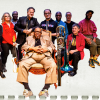



 Buy Now
Buy Now







